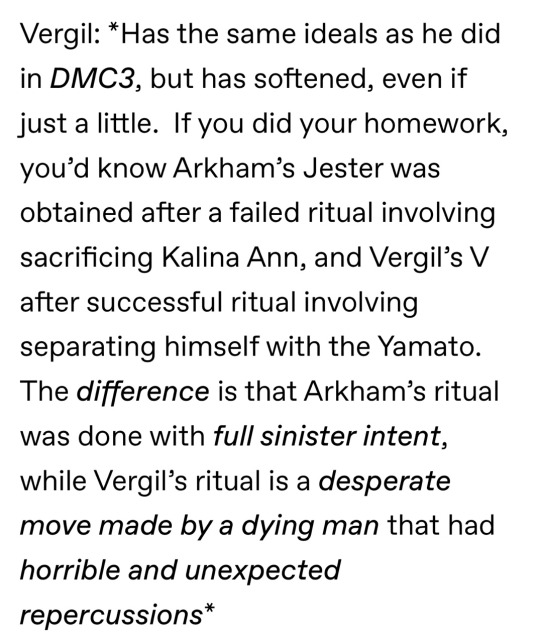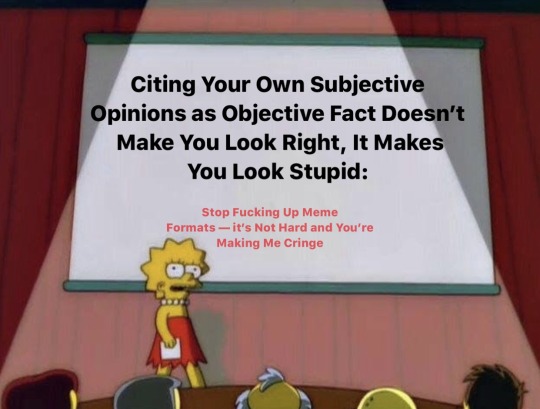#Neo & Kid Tini
Explore tagged Tumblr posts
Text
Eh, fuck it. I’m goin’ in (by request).
In head actual canon, Vergil is written as a quintessential anti-villain, but later on also displays quite a few of the traits of a Byronic hero.
Anti-Villains usually have mostly good, well-meaning, or reasonable end goals (e.g. seeking power to protect themselves). However, their means of getting to those goals are pretty dark — usually anging from undesirable to evil. Alternatively, their goals may even be selfish or have long-term consequences for others that they don't care about, but they usually do have some good in them and would typically team up with the hero if their goals/means to achieve those goals didn't conflict with those of the hero or the hero’s ideals. (e.g. totally kill Arkham for being a traitor and a clown - not necessarily in the correct order - but still want to use your fancy new rotating Monopoly property to gain unspeakable power).
Byronic Heroes have strong passions regarding their ideals, but are nonetheless still deeply flawed individuals who may act in ways which are socially reprehensible because it is contrary to mainstream society’s beliefs. Byronic heroes are on their own side and have their own set of beliefs that they will not bow for. They will not change those beliefs for anyone. A Byronic hero is a character whose internal conflicts are heavily romanticized and one who ponders and wrestles with their beliefs and the struggle that comes with those beliefs. Vergil does exactly this by being a jade-colored glasses type cynic that has a dark and troubled past that he was shaped by. He even has the romantic element of this trope in the form of the mysterious tryst that produced his son.
Both of these are well-used tropes that can be used to add a lot of dimension to a character. And in this case, it is, and this is why people are interested in Vergil. The writers of DMC have pretty much stuck to this characterization to different degrees to reflect Vergil’s experiences — with him going from a straight-faced, no-nonsense, arrogant teenager with a ton of repressed emotional baggage in DMC3 to a slightly softer, more sarcastic version of himself in DMC5 that’s willing to win the age-old rivalry by default... a thing Vergil would never have done in DMC3. Ever. If one was to actually shut up and pay attention, they might pick up on just how big a deal these tiny little changes in behavior actually are as emotionally repressed as Vergil.
In the canon script, Vergil is actually a bit of a fucking brat in DMC3, and does not really give a shit about anything except his pursuit of power, and he pays dearly for the decisions he makes he makes as a jilted teenager at the end of the game. He cares about only himself at the beginning of DMC5 because he is finally fucking free of his Nelo Angelo prison, but he is dying and he is desperate and desperate people do desperate things.
Whenever I see a very daft woman-child with clearly lot of hang-ups attacking people in fandoms and screeching nonsense, I often wonder ‘what went wrong?’. A weak sense of belonging is correlated to depression, and groups with shared interests, more often than not, do wonders for mental health. I also notice that women-children like this tend to make fun of other women and men (and they are men if they are in a certain age range - 18+ generally - manhood is not defined by who they are attracted to) and non-binary folks for ‘fawning’ over a character, I wonder just how fucking deeply sexually repressed you have to be in order to be this angry over other people expressing affection/shared interests in a fictional person.
I’m reminded of the time they mentioned those 3 background characters ‘fangirling’ over Gaston from Beauty and the Beast, because he was traditionally handsome guy and they, like the first time viewer, didn’t know just how awful he actually was. This doesn’t really have anything to do with the original topic, at all, so I also find myself wondering this person is projecting their anger issues onto random fictional characters again, and why they seem to have such a grudge against women or anyone they feel is completion/threat.
I’m also reminded that they clearly don’t understand Fight Club, either, or they wouldn’t be emulating Tyler Durden and using snowflake to describe both real people and fictional characters. They would get that the movie is a warning against hyper-masculinity and that, in calling things ‘snowflake’ in true Tyler Durden fashion, they create a very special type of irony where they externalize an idea about not being unique in order to create their own unique identity in opposition.
I also wonder why they mention the whole Punisher thing at all, and just assume they’re raging because because their Twitter got suspended for death threats to politicians/harassing game devs/getting destroyed in political debates by actual fucking racists and Neo-Nazis that should have been fucking cake to clown on, because all this person can do is spew the same 5-7 insults and threats despite these people being legitimately horrible people. Then I move on, because this is all fucking ridiculous as is, and I realize that my thoughts are already gonna be long enough.
Lastly, I wonder what clown fuckers and monster fuckers have to do with Vergil in this context? Like at all? Regardless of my own personal preferences, I only see someone who is angry over other people’s sexual preferences and attraction because they don’t understand their own and going off on weird, unrelated tangents because of it. It makes me wonder if they would be angry if I expressed interest in space Nazis who are not attractive by conventional means and go about being complicit to mass genocide on a planetary scale while also actually committing patricide?
Christ on a Bike.

*Sigh* I have to do all the heavy lifting, don’t I?

Might really is everything (to Vergil, because he sees it as a means to an end and the only to avoid being hurt again). And he takes this way, way too far and pays for it dearly.
Some people are too arrogant and too stupid to look past their own nose* and try to understand that people can make cataclysmically stupid decisions when they get pushed too far into a corner and see no other way out.
The way I see it, Vergil and Dante were already abnormal children that had a severely fucked up childhood — one that was defined by a horrific event they experienced from two separate, very different perspectives. Children are incredibly impressionable and their brains are like sponges — I could not imagine being scared and alone with something after me and having no one come look for me. It would scar me no matter what the explanation was. It’s reasonable believe that a 7-8 year old child who experiences something like that would grow up looking for a way to ensure it can never happen to them again, all while festering feelings of jealously toward a sibling who was shown (inadvertent) partiality on top of anger/betrayal because they didn’t understand why mom didn’t love them enough to come help. Kids can’t process trauma like adults, and this kind of shit mentally fucks children up in the real world for a lifetime. Traumatized minds don’t just ‘bounce back’ from something like that when given new evidence on a traumatic event — brains function like computer processors, but they aren’t just fixable like them. I’m sure if one was to actually look, they might actually see a fairly poignant message in all this.
People who are too arrogant often turn out not to be as smart as they think they are. If you’re excessively confident in yourself, you’re not going to listen to other people. (Note: Good job! this is ironic as fuck but the one line I didn’t have to edit!)
The only time Vergil smiles (& it’s a small, but genuine one — a grimace is literally the opposite of a smile and involves a frown, clenched teeth, etc.) is when he’s fighting Dante. This is because it is something he finally knows again — something that’s not part of a ~20 year long personal-made hell inside a suit of Angelo armor. There’s no real heat or tension in their DMC5 fights, and it’s comforting thing for both of them. Judging them for working out their shit this way is moronic because a.) they’re half-devil and don’t follow human social norms and b.) it’s a work of fiction anyway, you fucking numpty.
We don’t know if Vergil has remorse for the events he’s involved in because Vergil would not outwardly show remorse for raising the Temen-ni-gru or Temen-ni-gru 2: Horticulture Edition — that would be out-of-character for him. Any fan of the series should know this. However, if V is anything to go by (and he should be, because, y’know.. 👀), then yes, Vergil likely is remorseful.
The Abusive Parents trope is played with between Vergil and Nero, both with the loss of Nero’s arm and Vergil’s involuntary 20+ year absence because of his ownstubbornness and destructive decisions. Vergil did not know he even has a son and is emotionally constipated anyway, and Nero’s a hair-trigger hothead that wears his heart on his sleeve more than he is (probably even) aware of. Nero’s probably gonna be way too similar to teenaged Dante for Vergil’s tastes, and they’re gonna clash a lot, which creates drama intended to be entertaining for the audience.

Nothing says “I have fully missed the point” and “holy shit what went wrong in my life?” quite like someone arguing the same poorly researched 5-7 takes they have been arguing for like 6 months now on multiple social media sites.
I saw this one Youtube commenter a little while back and I almost spit out my drink... I knew some people that didn’t like DMC5 were obsessively angry to the point of being totally fucking mental about people liking the game, but arguing in YouTube comments? Holy fucking shit that is another level of feral (and not the fun kind). I’d describe this person as a “cuck” or “bootlicker” but then I realize I’m not like 12 and don’t say the n-word on Xbox live, and that those insults don’t make sense anyway.

And this confusing shit, making me wonder what fucking game this person was playing?:


If one is going to use a quote to end something, like, say, a legitimate character critique that is not steeped in the bias of their opinion, it makes the most sense to use a quote from something/someone like an objectively important literary work or author. Since Vergil is a Literary Boi™ and there may be “sci-fi / horror fangirls” reading this, I’ll throw a bone out to ‘em (since we’re at the end of this dog walk) and use a quote from Guy de Maupassant’s Le Hora et autres novelles fantastiques:
“A sick thought can devour the body's flesh more than fever or consumption.”
For the unfamiliar: Guy de Maupassant (1850-1893) is often considered the father of the modern short story, and used pessimistic and disillusioned terms to depict the lives and destinies and interactions of the people and society as a whole in his stories. His short stories Le Hora and Diary of a Madman inspired the 1963 Vincent Price horror movie of the same name as the latter. Maupassant’s later life was heavily characterized by self-isolation and paranoia, and he penned his own epitaph before he attempted to slit his own throat with a letter opener and died in an asylum at age 42:
“J’ai tout convoité, et je n’ai joui de rien.”
I will let whoever reads this translate, and think, on that.
—
(And no, no sources cited section because I’ve never been a particularly religious bitch.)
*It’s an idiom, don’t even try to spin that shit as anti-Semitic you absolute fucking loon.
#Long post#Dmc Vergil#DmC Dante#dmc#Devil May Cry#Devil May Cry 5#DMC5#Dante#Vergil#thephantomporg84#derelict stranger
84 notes
·
View notes
Video
youtube
Miss Pru – Ugesi ft. Emtee, Sjava, Saudi, Neo & Kid Tini
0 notes
Link
“And to be roughing up anti-Nazi protesters while handling literal Nazis with kid gloves... it’s absurd,” Come for the headline, stay for the article...
2 notes
·
View notes
Text
Kevin Costner’s “Highwaymen”: A plateful of fascism, racism on the side
youtube
Kevin Costner? Kevin “Dances With Wolves” Costner, who defended the Lakota against the genocidal white patriarchy? Kevin “Robin Hood: Prince of Thieves” Costner, who was, you know, the prince of thieves, and defied the, you know, genocidal white patriarchy? That Kevin Costner is a fascist?
Damn straight, dude. Big Daddy Kev has had with these kids, who are, it seems, nothing but a bunch of damn murderer-worshippin’ hippies, brainwashed by the damn media into turning their backs on everything that’s decent, wholesome, and capitalist in American life. It’s time to whup some sense into their damn heads, or maybe just damn kill ‘em, because, come to think of it, that would solve the problem pretty damn quick.
That seems to be the message of Kevin’s latest, Highwaymen, done for the small screen and available on Netflix. Highwaymen didn’t seem to get much press when it premiered a couple of weeks ago, either pro or con, but, as a retelling—and, basically, a point-by-point rebuttal—of Warren Beatty’s neo nouvelle vague masterpiece, Bonnie & Clyde, which hit the American movie-going public like a bomb back in 1967, made Pauline Kael famous, and (so I said in my review) allowed American movies to go up once and for all, it certainly makes a statement, which I am going to disagree with, at length.
Maybe Kevin Costner, who was all of twelve when B&C came out, couldn’t understand why Warren “Pretty Boy” Beatty was getting all his press, or maybe Kevin is just souring with age, or maybe Trumpism is catching—which God forbid—but, whatever the reason, it’s clear that Kevin decided that, 50 years after the fact, it was time to take 82-year-old Pretty Boy down a peg. Surely few films—particularly one of such expense and quality—have been so closely crafted to “refute” an earlier film. Highwaymen scarcely makes “sense” if not viewed with constant awareness of Bonnie & Clyde.1
The film is visually very well made, like Bonnie & Clyde working very hard to convey the harshness of Depression-Era Texas. The film opens by showing us an old timey car pulling up in a field and a dainty gal, obviously Bonnie because she’s packing a tommy gun,2 firing it into the air as a signal for jail break (actually a “prison fam break”) that she and Clyde are apparently coordinating. She’s deliberately shown to us in a long shot, letting us know that (probably) we won’t be getting a real look at either Bonnie or Clyde until the end, rather like Mrs. Bates in Psycho.
Afterwards, we cut to the offices of the Texas governor—canny, soulless “Ma” Ferguson (Kathy Bates). Ma’s a fraud, like all politicians, all image and no substance. She’s taking heat from the press for all this Bonnie & Clyde stuff, and it’s time to find someone to blame for her own incompetence, time to pull “legendary” Texas Ranger Frank Hamer out of retirement. Ma shut down the Rangers for some unspecified reason, but, since she’s a chick, you can bet it was some kind of chickenshit chick shit, like some little Missy got her little nose all out of joint because some dude might have given her ass a little pat. If it’s not for sale don’t advertise, sweetheart! Yeah, the gals always be whinin’, but when there’s a real job to be done, all of a sudden they’ve got to find a real man to do it.
And Frank, well, he’s a real man, living large and in charge, got a big house and fancy young society wife to run it for him. He sure don’t need no job, and no need to do Ma no favors, but Bonnie and Clyde, they’ve been killing peace officers. It’s a job that’s got to be done, and a real man don’t quit till the job’s done.
Frank sets off in the fancy new Lincoln he just gave his wife, a car whose elegant lines will be featured over and over again in the film, with near fetish-like devotion, seemingly a compulsive echo of all the gleaming thirties roadsters that Bonnie and Clyde pilfer in Beatty’s film, though none of them, I think, were luxury models like Frank’s Lincoln.3
Once Frank’s got the car, he needs a companion, and he finds one in fellow dinosaur Maney Gault (Woody Harrelson). Maney don’t look like much, and he has to pee a lot (which, when you come to think about it, is pretty damn funny), but Frank, he’s looking for guts, not glamor, and Maney’s got the real stuff in his belly.
And so off they go, taking shit from all kinds of snot-nosed fancy-pants kids in the state police and even the FBI. They got airplanes and shit, they can even listen to your telephone conversations and you can’t do anything about it! How scary is that!4
Frank and Maney, they don’t have nothin’, nothin’ but smarts, smarts and a whole shitload of automatic weapons that Frank buys, in a wet-dream gun lovers’ sequence—surely ten thousand dollars of cargo or more, practically none of which is actually used in the film.5 I would be very unsurprised to learn that Costner is a gun lover and has all of these items in his collection, weapons that he probably enjoys hefting and then throwing at his guests. What’s the matter, sissy boy? Can’t handle a piece?
For most of the rest of the film, Frank and Maney just drive around in their shiny new Lincoln, Frank raining contempt on all the punk kids in the FBI, the damn newspapers, and damn general public for making heroes out of a pair of murderous brats, while Maney has to take a leak every ten minutes. (Okay, that part’s funny.) At one point, Maney almost gets a shot at Clyde, but then he’s mobbed all these damn broads, like he’s a celebrity or something, before Maney can pull the trigger.
The film goes to absurd lengths to make Bonnie, who was not a very nice person, not merely a hardened criminal but, well, a sadistic, castrating bitch. At one point, Hamer “deduces”, from footprints at a crime scene, that Bonnie wounded a policeman, then rolled him over with her foot in order to force him to watch before she blew his brains out. But we are both told and shown that Bonnie is tiny (90 pounds) and walks with a limp.6 I’ll bet Kevin Costner couldn’t roll a 90-pound woman over with his foot, much less a 200-pound man. Women issues much, Kevin?
Finally, Frank gets a solid lead, beating the crap out of some punk to find out what Bonnie and Clyde are up to, because beating the crap out of people is pretty much the best solution to any law enforcement problem. He learns that the Barrow gang is headed to Louisiana to hole up with the father of one of the gang. Frank makes a deal with the father, as happened in real life and the Beatty film, arranging for an ambush. None of this fair play bullshit for him! He also insists that a young deputy come along with them to identify Clyde, setting up a ludicrous (and fraudulent) finale to teach the kid and the audience about “real life”—from real life actor Kevin Costner.
Naturally, the kid, being a kid, is a little squeamish about the prospect of seeing two people shot to pieces from ambush, so Maney has to explain the facts of life to the kid. (Many rather than Frank, because Frank is more or less a god, and gods don’t explain themselves. If they did, they’d lose caste.)
Maney tells the kid a story about when he was a young Texas Ranger. The Rangers have located a huge gang of Mexican desperados, but when they try to arrest them, announcing “Manos arribos” (or something like that, meaning “Hands up!”), well, instead of putting up their hands, the Mexicans start shooting. Day after day, it goes on like this, the Rangers losing a man or two every day until Frank shows up. No more “manos arribos”, motherfucker! We shoot first, and we shoot to kill! And that’s how it goes down, and Maney even blows away this innocent, unarmed, fifteen-year-old kid, who just wanted to escape, putting six slugs in the little fucker. Cause that’s what a man does! Adios, muchacho!
Uh, really? If a gang shoots a cop, the cops will come back time and time again, trying to arrest the gang peacefully? Really? They needed Frank Hamer to tell them they were doing it wrong? And, why, exactly, did Maney have to put six slugs in a non-combatant? Is this like one of those “Kill ‘em all, Let God sort ‘em out” tee-shirts you get at a gun show? In fact, of course, they didn’t need to have the kid come along in the first place. Maney knows what Clyde looks like, and was going to drop him earlier, if only he could have gotten a clean shot. The kid’s just a lazy plot device.
But the kicker comes when Frank, Maney, the kid, a couple of local police finally ambush Bonnie and Clyde, because it isn’t an ambush. Frank steps out in front of the car and gives the two a chance to surrender, just what Maney just told us ls what pussies do, and is why pussies never get the job done. Yeah, Kevin Costner wants to give us this hard-ass “moral”, that civilization depends on the occasional cold-blooded murder. But, at the same time, he wants the audience to like him. What a coward.
When I saw the 1998 Gus Van Sant shot for shot remake of Alfred Hitchcock’s Psycho (1960), I walked out of theater thinking “Now he should remake it again, except this time showing us everything that Hitchcock didn’t show us!” Dunno if it would work, but maybe. ↩︎
Tommy guns, with their drum magazines, though (I’ve read, though Wikipedia says different) they often did not work very well and were not often used, were a legendary symbol of gang violence. When I was a small boy, the conclusion of the visitor’s tour of the FBI was a demonstration of a tommy gun in a special shooting range in the basement, though I don’t know if FBI agents ever used one in a fire fight. In those days the FBI had a fairly low-key building across the street from the Department of the Interior, which a had very low-budget aquarium open to the public. You could see a guy shoot up a target with a tommy gun and then walk across the street and look at the two-headed turtle (for real). ↩︎
In my original review of B&C, I remarked that all of the cars Bonnie and Clyde steal are in sparkling condition, with gleaming chrome and, often, two-tone paint jobs—just what you wouldn’t find in East Texas during the Great Depression. Beatty starred in Splendor in the Grass (1961), featuring all the polished roadsters that director Elia Kazan didn’t get to drive while working his way through Williams College back in the day. Many film directors, ranging from Jean-Luc Godard to Steven Spielberg, compulsively feature in their films the cars they didn’t get to drive when they were young. ↩︎
In the thirties, every phone call was individually placed by an operator, who could listen in if she wanted to (all telephone operators were women), though of course they weren’t supposed to. Furthermore, in rural areas, if there were phones at all, houses were connected on “party lines”. Anyone on your line could listen to your call. ↩︎
If you’re wondering, Bonnie and Clyde were killed before the National Firearms Act of 1934 was signed into law, a law that, in any event, simply put a tax on automatic weapons, so that only respectable people could buy them. ↩︎
The real Bonnie Parker, by the time of the events in the film, could not walk unassisted, after suffering third-degree burns on her leg during an automobile accident. ↩︎
0 notes